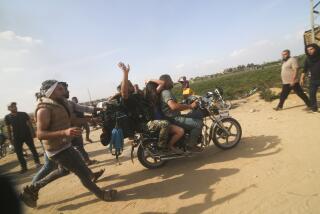U.N. Notes Iran Executions but Says Total Drops
- Share via
GENEVA — A U.N. report released Thursday says at least 7,000 people were executed in Iran between 1979 and 1985 and cites allegations that torture in the country continues to be widespread.
But the report, compiled by Reynaldo Galindo Pohl of El Salvador for the 43-nation U.N. Human Rights Commission, notes a “certain (positive) evolution in the situation of human rights” in Iran.
It said that executions numbered in the thousands in the first three years after the Ayatollah Ruhollah Khomeini’s Islamic revolution in 1979 but dropped to 500 in 1984 and 470 in 1985. No figure was provided for 1986, but the report said the downward trend appears to have continued.
Basis of Report
The report was based on information from opposition groups in Iran and from non-governmental organizations including the Bahai international community and Amnesty International, the London-based human rights organization. It said the allegations contained in the report were submitted to the Iranian government, but Tehran has not replied.
The report, the third on Iran, listed for the first time allegations of human rights violations against doctors. It said this was in response to the doctors’ opposition to new legislation in 1986 increasing government control over the Iranian Medical Assn.
The report said the association’s elected board of directors has been dissolved by the government and several of its officers detained and tortured. In addition, 450 physicians from two hospitals were reported arrested.
‘Widespread Torture’
Although the Iranian constitution prohibits torture, the report said, “the information received by (Galindo) contained numerous detailed allegations of widespread torture and ill-treatment.”
It said the primary victims were supporters of political opposition groups or members of religious or ethnic minorities and that most of the alleged cases of torture appeared to have occurred during interrogation to extract confessions or information.
Most of the allegations concerned beating, flogging, burning with cigarettes, electric shock, sexual abuse and psychological torture such as mock executions, the report said. It quoted one source as saying that 64 types of physical and psychological torture were used in Iranian prisons.
Tortured in 3 Prisons
The report quoted one witness, Mina Vatani, as saying she had been tortured in three prisons between November, 1981 and November, 1984. She said she saw 70 people executed in Evin prison in Tehran in early 1982, including pregnant women and women who had been raped, the report said.
The report said that members of the Bahai faith and other religious and ethnic minorities “continued to be subjected to harassment, discrimination and persecution.”
It said that persecution of Bahais took the form of summary executions, torture, arbitrary imprisonment, arbitrary seizure of homes and desecration and destruction of holy places.
It said 188 Bahais have been summarily executed since 1978, including seven in the first 10 months of last year.
The Bahai faith, which stresses the unity of all religions and was founded in 1844 in Persia, is the largest minority religion in Iran, with an estimated 400,000 adherents.
The report recommended formation of an independent Iranian commission on human rights, with guarantees of unrestricted gathering of information and access to authorities.
More to Read
Sign up for Essential California
The most important California stories and recommendations in your inbox every morning.
You may occasionally receive promotional content from the Los Angeles Times.










